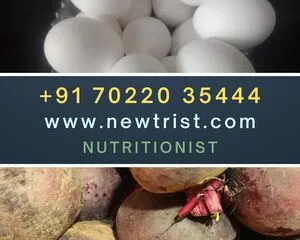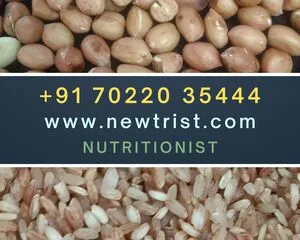Foods to increase endometrial thickness consist of whole grains, fruits, vegetables, nuts, seeds, skimmed dairy, oily fish, deskinned chicken, and soy products.
- Early morning drink @ 6:30 am: Warm lemon water with honey and soaked walnuts
- Breakfast @ 9 am: Brown rice-ragi dosa with tomato chutney
- Mid-morning meal @ 11 am: Mint-watermelon salad
- Lunch @ 1 pm: Quinoa vegetable pulav with beetroot raita and boiled egg
- Evening snack @ 4 pm: Salted plain popcorn/Roasted peanuts
- Dinner @ 7 pm: Dahlia vegetable upma with turmeric latte at bedtime
Consult 19 years experienced Chief Nutritionist Vasanthi for expert advice and a personalized diet plan. In-person consultation at HSR, Koramangala, Bellandur, Haralur, and video consultation across India.
- Consultation INR 750
- 1 Week personalized diet plan INR 2000
- 1 Month personalized diet plan INR 4000
- 3 Months personalized diet plan INR 9000

Table of Contents

Foods to thicken uterine lining for IVF
Foods to thicken the uterine lining for IVF are whole grains like brown bread, oats, quinoa, brown rice, whole wheat, fruits, vegetables, nuts, seeds, and fatty fish.
The endometrium is a layer present in the uterus which prepares itself for the implantation of the fertilized embryo. The endometrial layer sheds during menstruation if fertilization does not occur. Reduced thickness of the endometrial layer makes the uterus weak and unable to hold the egg for further growth into a fetus.
A weak endometrial lining may cause symptoms like painful menstruation, clots in menstrual blood, poor chances of conception, recurring loss of pregnancy, and complications during pregnancy.
Whole grains are the warehouse of carbohydrates, proteins, fiber, essential vitamins, and minerals. Consumption of whole grains increases the implantation of the egg to the wall of the uterus after IVF. Daily intake of whole grains thickens the lining of the uterus by 0.4 mm.
Fruits are excellent sources of antioxidants, fiber, and essential minerals. Fruits produce nitric oxide that is responsible for the widening of the blood vessels and improving the blood circulation to the uterus and helping in the thickening of the lining of the uterus.
Nuts and seeds are rich in vitamin E which helps in the thickening of the uterus lining. Vegetables provide a good supply of fiber which keeps you satiated for a long time reducing the chances of obesity and related chronic conditions.
Protein-rich foods like poultry, fish, dairy products, and soy foods contain a naturally occurring compound L-Arginine, which enlarges the blood vessels and improves the blood flow to the uterus which in turn increases the thickness of the uterus.
Foods rich in omega-3 fatty acids such as fatty fish, avocados, nuts, seeds, and olive oil dilates the blood vessels and is essential for the thickening of the endometrium.

Indian food to increase endometrial thickness
Indian foods to increase endometrial thickness are beans and legumes like moong dal, toor dal, urad dal, kidney beans, black beans, rajma, and masoor dal, fruits like apples, oranges, pomegranates, papayas, guavas, and pears, vegetables such as leafy greens, cabbage, mushrooms, tomatoes, spinach, sweet potatoes, onions, garlic, cauliflower, carrots, beetroots, and radishes, whole grains like brown rice, finger millet, Kodo millet, foxtail millet, jowar, and bajra.
Lean meats such as skinless chicken, turkey, fish, eggs, and dairy products provide a good source of animal proteins rich in essential amino acids.
A healthy diet improves estrogen levels which is essential for the growth of the uterine lining. A reduction in estrogen levels decreases the strength of the lining and makes it too weak to hold the embryo onto the uterus.
Infections, scarring, and low levels of hormones may be the risk factors for the weak lining of the uterus. Increased physical activity is required in addition to a healthy diet to thicken the uterine lining. Simple walking and 30 minutes of physical activity daily improve blood circulation and support the thickening of the uterine lining.

FAQs
What is endometrial thickness increasing food?
Foods to increase endometrial thickness are whole grains such as oats, brown rice, quinoa, millet, fresh citrus fruits, vegetables, nuts, seeds, lean meats, and oily fish. Apart from the intake of healthy foods, walking can greatly help in increasing endometrial thickness. Increasing blood circulation to the pelvic region encourages the growth of the endometrial lining.
Is avocado good for the uterus lining?
Avocados are good sources of healthy fats and vitamin E that improve the lining of the uterus. Avocados are an excellent addition to a fertility diet which helps in efficient implantation. Avocados contain monounsaturated fatty acids that promote ovulation and increase the chances of pregnancy. the potassium content of avocados balances estrogen levels and improves blood flow which thickens the uterus lining.
Is bone broth good for female fertility?
Bone broth is rich in proteins, healthy fats, vitamins, and minerals that boost fertility in females. Bone broth helps in balancing hormonal levels and enhances fertility. Bone broth improves the gut microbiome and provides nourishment to the uterus. Bone broth stimulates the production of Female Stimulating hormones (FSH) in females.
Is pomegranate good for endometrial thickness?
Pomegranates are a nutrient-dense fruit that improves blood circulation and thickens the endometrial lining. Pomegranates are rich in antioxidants, folic acid, vitamin E, and fiber that enhance the thickness of the uterus lining. Consuming pomegranates helps in balancing the estrogen and progesterone levels in women which improves endometrial thickness.
What are the best foods for the uterine lining?
Protein-rich sources like deskinned chicken, oily fish, legumes, pulses, fruits, vegetables, and healthy fats such as avocados, fatty fish, nuts, seeds, and olive oil contribute to the healthy build-up of the uterine lining. Include leafy greens and whole grains as part of your daily diet to improve your uterine lining. Consume cold water low-mercury fish such as salmon, sardines, mackerel, tuna, and herring.
What foods strengthen the uterine lining?
Whole grains, fish rich in omega-3 fatty acids, fruits, vegetables, nuts, and protein-rich sources play a main role in strengthening of the uterus lining. Beans, spinach, beetroot, pumpkin seeds, asparagus, and grass-fed meats should be included in the diet to promote uterine lining. Consume organic hormone-free meats and healthy fats like avocado, nuts, and olive oil regularly to strengthen the uterine lining.
Which fruit improves uterine lining?
Citrus fruits like oranges, lime, lemons, and watermelon contain good amounts of nitric oxide that improves the blood supply to the pelvic area and other parts of the body. Sufficient blood flow increases the thickness of the uterine lining. The vitamin E content of avocados helps in the thickening of the endometrial lining. Dates are excellent sources of iron and fiber that maintain a hormonal balance and promote the growth and development of the endometrial tissues.
Foods to prevent uterine cancer
Foods to prevent uterine cancer consist of healthy foods like fruits, vegetables, whole grains, lentils, plant-based foods, nuts, and seeds, and restriction of sugary foods, foods rich in saturated fats such as red meat and processed meat, salty foods, and fried foods.

What is the role of fruits and vegetables in the prevention of uterine cancer?
A rich-fiber diet reduces the chances of uterine cancer. Intake of 4-5 servings of fruits and vegetables per day keeps you full, helps in the regulation of blood sugar levels, maintains a healthy weight, and lowers cholesterol levels. Fiber improves gut health and prevents the formation of cancerous cells.
Is garlic effective in preventing uterine cancer?
Garlic is rich in vitamin B6, vitamin C, manganese, and selenium which alleviates the growth of cancer cells in the uterus. Garlic lowers the risk of stomach, colon, and breast cancers. Garlic adds flavor to any dish and is beneficial for its medicinal properties.
Are leafy greens good to prevent uterine cancer?
Leafy greens and dark green vegetables like spinach, kale, and broccoli are extremely nutritious and filled with fiber, vitamins, minerals, and phytochemicals that lower the risk of various cancers. Including greens in the diet helps in maintaining a healthy weight and the risk of chronic lifestyle disorders.
How do tomatoes prevent the formation of cancer cells in the uterus?
Tomatoes contain a powerful antioxidant, lycopene reduces the risk of certain cancers. Consistent intake of tomatoes provides numerous health benefits in the prevention of uterine cancer. Lycopene is a carotenoid that stops the growth of endometrial cancer cells. Tomatoes can be incorporated into a wide variety of dishes like soups, salads, curries, and sabzis.
What role does green tea play in the prevention of uterine cancer?
Green tea is rich in antioxidants that act as a cancer-fighting drink. Green tea protects the body from the damage caused due to free radicals, aids in effective detoxification, and slows down the growth of cancer cells. Green tea speeds up the metabolism and helps in weight loss.
How do cruciferous vegetables prevent the formation of cancer cells?
Cruciferous vegetables and leafy greens reduce the risk of uterine cancer and boost overall health. Cruciferous vegetables like cauliflower, cabbage, broccoli, brussels sprouts, and bok choy contain certain enzymes that flush toxins, chemicals, and other cancer-causing substances from the body.
Are berries good for uterine cancer?
Berries such as strawberries, blueberries, and blackberries contain polyphenols and phytochemicals that inhibit the growth of carcinogens and eliminate them from the body. Berries are delicious fruits that can be added to fruit salads, topped over desserts, or eaten as a whole.